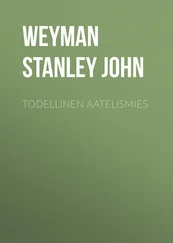Stanley Weyman - The Great House
Здесь есть возможность читать онлайн «Stanley Weyman - The Great House» — ознакомительный отрывок электронной книги совершенно бесплатно, а после прочтения отрывка купить полную версию. В некоторых случаях можно слушать аудио, скачать через торрент в формате fb2 и присутствует краткое содержание. Жанр: foreign_language, foreign_prose, на английском языке. Описание произведения, (предисловие) а так же отзывы посетителей доступны на портале библиотеки ЛибКат.
- Название:The Great House
- Автор:
- Жанр:
- Год:неизвестен
- ISBN:нет данных
- Рейтинг книги:4 / 5. Голосов: 1
-
Избранное:Добавить в избранное
- Отзывы:
-
Ваша оценка:
- 80
- 1
- 2
- 3
- 4
- 5
The Great House: краткое содержание, описание и аннотация
Предлагаем к чтению аннотацию, описание, краткое содержание или предисловие (зависит от того, что написал сам автор книги «The Great House»). Если вы не нашли необходимую информацию о книге — напишите в комментариях, мы постараемся отыскать её.
The Great House — читать онлайн ознакомительный отрывок
Ниже представлен текст книги, разбитый по страницам. Система сохранения места последней прочитанной страницы, позволяет с удобством читать онлайн бесплатно книгу «The Great House», без необходимости каждый раз заново искать на чём Вы остановились. Поставьте закладку, и сможете в любой момент перейти на страницу, на которой закончили чтение.
Интервал:
Закладка:
He got her some tea, and marshalled her carefully to the upper line. But his answer had jarred upon her, and when they were again seated, Mary kept her thoughts to herself. Beyond Birmingham their route skirted towns rather than passed through them, but she saw enough to deepen the impression which the lanes and alleys of that place had made upon her. The sun had set and the cold evening light revealed in all their meanness the rows of naked cottages, the heaps of slag and cinders, the starveling horses that stood with hanging heads on the dreary lands. As darkness fell, fires shone out here and there, and threw into Dantesque relief the dark forms of half-naked men toiling with fury to feed the flames. The change which an hour had made in all she saw seemed appalling to the girl; it filled her with awe and sadness. Here, so near the paradise of the country and the plough, was the Inferno of the town, the forge, the pit! Here, in place of the thatched cottage and the ruddy faces, were squalor and sunken cheeks and misery and dearth.
She thought of the question which Lord Audley had raised twenty-four hours before, and which he had told her was racking the minds of men-should food be taxed? And she fancied that there was, there could be, but one answer. These toiling masses, these slaves of the hammer and the pick, must be fed, and, surely, so fed that a margin, however small, however meagre, might be saved out of which to better their sordid lot.
"We call this the Black Country," Basset explained, feeling the silence irksome. After all, she was in his charge, in a way she was his guest. He ought to amuse her.
"It is well named," she answered. "Is there anything in England worse than this?"
"Well, round Hales Owen and Dudley," he rejoined, "it may be worse. And at Cradley Heath it may be rougher. More women and children are employed in the pits; and where women make chains-well, it's pretty bad."
She had spoken dryly to hide her feelings. He replied in a tone as matter-of-fact, through lack of feeling. For this he was not so much to blame as she fancied, for that which horrified her was to him an everyday matter, one of the facts of life with which he had been familiar from boyhood. But she did not understand this. She judged him and condemned him. She did not speak again.
By and by, "We shall be at Penkridge in twenty minutes," he said. "After that a nine-miles drive will take us to the Gatehouse, and your journey will be over. But I fear that you will find the life quiet after Paris."
"I was very quiet in Paris."
"But you were in a large house."
"I was at the Princess Czartoriski's."
"Of course. I suppose it was there that you met Lord Audley?"
"Yes."
"Well, after that kind of life, I am afraid that the Gatehouse will have few charms for you. It is very remote, very lonely."
She cut him short with impatience, the color rising to her face. "I thought you understood," she said, "that I was in the Princess's house as a governess? It was my business to take care of a number of children, to eat with them, to sleep with them, to see that they washed their hands and kept their hair clean. That was my position, Mr. Basset. I do not wish it to be misunderstood."
"But if that were so," he stammered, "how did you-"
"Meet Lord Audley," she replied. "Very simply. Once or twice the Princess ordered me to descend to the salon to interpret. On one of these occasions Lord Audley saw me and learned-who I was."
"Indeed," he said. "I see." Perhaps he had had it in his mind to test her and the truth of Audley's letter, which nothing in her or in my lord's conduct seemed to confirm. He did not know if this had been in his mind, but in any case the result silenced him. She was either very honest or very clever. Many girls, he knew, would have slurred over the facts, and not a few would have boasted of the Princess's friendship and the Princess's society, and the Princess's hôtel, and brought up her name a dozen times a day.
She is very clever, he thought, or she is-good. But for the moment he steeled himself against the latter opinion.
No other travellers alighted at Penkridge, and he went away to claim the baggage, while she waited, cold and depressed, on the little platform which, lit by a single oil lamp, looked down on a dim churchyard. Dusk was passing into night, and the wind, sweeping across the flat, whipped her skirts and chilled her blood. Her courage sank. A light or two betrayed the nearness of the town, but in every other direction dull lines of willows or pale stretches of water ran into the night.
Five minutes before she had resented Basset's company, now she was glad to see him return. He led the way to the road in silence. "The carriage is late," he muttered, but even as he spoke the quick tramp of a pair of horses pushed to speed broke on them, lights appeared, a moment later a fly pulled up beside them and turned. "You are late," Basset said.
"There!" the man replied. "Minutes might be guineas since trains came in, dang 'em! Give me the days when five minutes made neither man nor mouse, and gentry kept their own time."
"Well, let us get off now."
"I ask no better, Squire. Please yourself and you'll please me."
When they were shut in, Basset laughed. "Stafford manners!" he said. "You'll become used to them!"
"Is this my uncle's carriage?" she asked.
"No," he replied, smiling in the darkness. "He does not keep one."
She said no more. Though she could not see him, her shoulder touched his, and his nearness and the darkness in which they sat troubled her, though she was not timid. They rode thus for a minute or two, then trundled through a narrow street, dimly lit by shop windows; again they were in the dark and the country. Presently the pace dropped to a walk as they began to ascend.
She fancied, peering out on her side, that they were winding up through woods. Branches swept the sides of the carriage. They jolted into ruts and jolted out of them. By and by they were clear of the trees and the road seemed to be better. The moon, newly risen, showed her a dreary upland, bare and endless, here dotted with the dark stumps of trees, there of a deeper black as if fire had swept over it and scarred it. They met no one, saw no sign of habitation. To the girl, accustomed all her life to streets and towns, the place seemed infinitely desolate-a place of solitude and witches and terror and midnight murder.
"What is this?" she asked, shivering.
"This is the Great Chase," he said. "Riddsley, on the farther side, is our nearest town, but since the railway was opened we use Penkridge Station."
His practical tone steadied her, but she was tired, and the loneliness which she had felt while she waited on the bleak platform weighed heavily on her. To what was she going? How would her uncle receive her? This dreary landscape, the gaunt signpost that looked like a gibbet and might have been one, the skeleton trees that raised bare arms to heaven, the scream of a dying rabbit, all added to the depression of the moment. She was glad when at last the carriage stopped at a gate. Basset alighted and opened the gate. He stepped in again, they went on. There were now shadowy trees about them, sparsely set. They jolted unevenly over turf.
"Are we there?" she asked, a tremor in her voice.
"Very nearly," he said. "Another mile and we shall be there. This is Beaudelays Park."
She called pride to her aid, and he did not guess-for all day he had marked her self-possession-that she was trembling. Vainly she told herself that she was foolish, that nothing could happen to her, nothing that mattered. What, after all, was a cold reception, what was her uncle's frown beside the poverty and the hazards from which she had escaped? Vainly she reassured herself; she could not still the rapid beating of her heart.
Читать дальшеИнтервал:
Закладка:
Похожие книги на «The Great House»
Представляем Вашему вниманию похожие книги на «The Great House» списком для выбора. Мы отобрали схожую по названию и смыслу литературу в надежде предоставить читателям больше вариантов отыскать новые, интересные, ещё непрочитанные произведения.
Обсуждение, отзывы о книге «The Great House» и просто собственные мнения читателей. Оставьте ваши комментарии, напишите, что Вы думаете о произведении, его смысле или главных героях. Укажите что конкретно понравилось, а что нет, и почему Вы так считаете.












